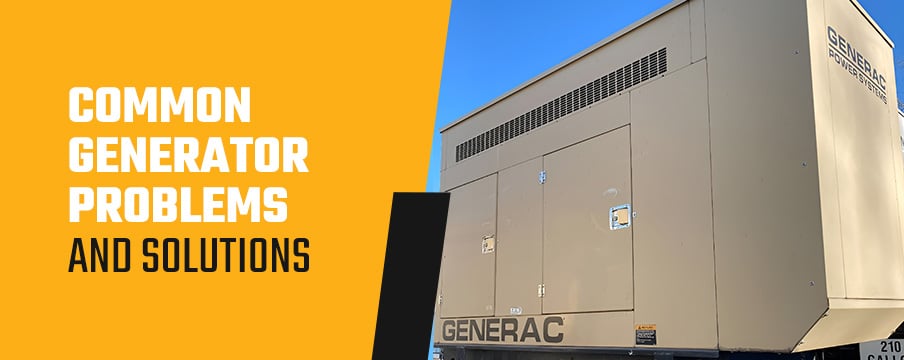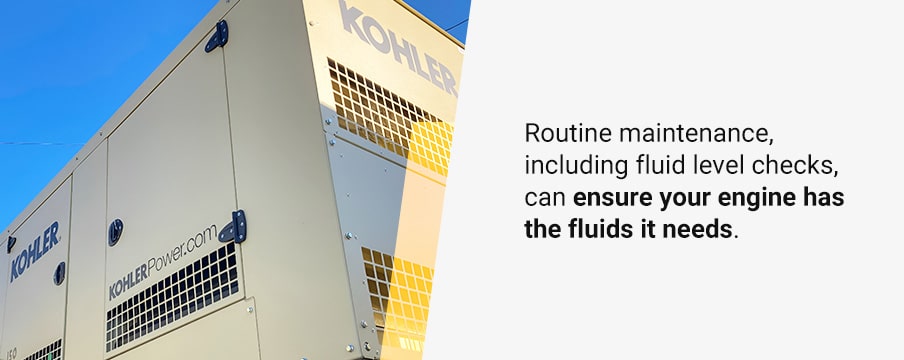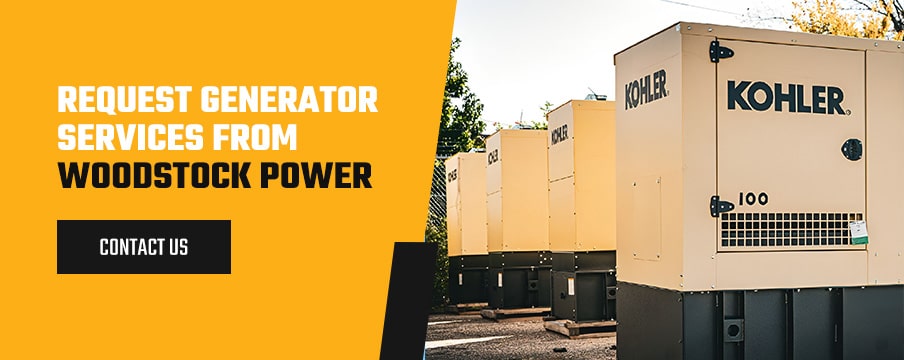8 Common Reasons Generators Stop Working & How to Fix It

Basic knowledge of the most common generator problems and solutions can take you a long way. Knowing some prominent issues that can occur will ensure you know what to watch for so you can prevent unnecessary downtime and expenses. Having information about solutions will prepare you for generator troubleshooting and repairing your equipment if any problems arise, allowing you to maximize productivity and equipment life spans.
By understanding the connections between common problems and solutions, you can ensure your generators run as efficiently as possible so you can make the most of your purchase or rental. Here are some of the most common reasons a standby generator may not be working:
1. The Battery Fails
Battery failure is one of the most common issues a generator faces. Batteries wear down with age and as they experience any damage or stress. Over time, your batteries lose the power you need to run your generator. A dead battery can also prevent the generator from turning over, but you may be able to use the pull starter to keep the engine running until you can charge the battery in this case. Otherwise, know your generator’s battery service life to determine the best time to replace the battery without experiencing downtime without it. In instances of portable generators and generator rentals, a unit may be left connected to the battery and it will drain down.
The Solution
Always make sure the batteries, chargers and all cables and connections leading to and from the battery are in good condition before operating your generator. Routinely clean and tighten connections and remove any sulfation buildup from the battery plates. Lead sulfates can keep the battery from delivering a strong current, resulting in preventable system failures. You can also install a battery charger that keeps the battery conditioned and prevents the battery from draining down completely.
2. Generator Won’t Start
There are several reasons a generator may not start, ranging from simple fixes to significant concerns. Issues like low fuel, a lack of oil, broken or damaged spark plugs and carburetor buildup can prevent your generator from starting. All of these problems can have unique causes and require different fixes. We’ll cover some of these issues more deeply later.
The Solution
If your generator fails to start, double-check that you have set the automatic operation controls. The main control switch must be in the “off/reset” position for the generator to automatically kick in when needed. If someone presses the emergency stop button or triggers alarms on the control switch, your generator’s automatic settings may have turned off.
In cases where you have had your generator serviced, make sure the automatic controls are set again before the generator’s next use. If you’re still experiencing diesel generator starting problems, check all connections to verify the machine is in full working condition.
You should also inspect the spark plug and ignition coil if your generator won’t start. Spark plugs obtain wear over time, so it’s helpful to use an ignition spark tester to evaluate each component. Use this device to ensure an electrical current is reaching your engine. Employ a similar strategy for testing the ignition coil to ensure it is sending voltage to the spark plug. If either of those components is defective, replace them before attempting to run the generator again.
If your generator is still continuing to experience issues, there may be a greater underlying issue that is causing failure of the unit to perform. Be sure to speak with a dealer or generator technician to get the unit inspected and evaluated for repairs.
3. The System Stalls During Operation
Signs of a generator not working can include stalling or stuttering. If your generator starts working but falters while running, a few different issues could be the culprit. Fouled spark plugs in natural gas generators, for instance, can prevent the machine from producing enough power to keep running.
When it comes to diesel generators, the fuel pump may be malfunctioning or there may be a greater underlying issue. This could be defective parts or the fuel may be contaminated and causing the fuel pump and hoses to get clogged.
The Solution
You should change your generator’s spark plugs after every 100 hours of use or if they’re worn or cracked. Failing spark plugs is mainly a common issue with natural gas generators, as diesel generators do not have spark plugs.
In addition, ensure the generator’s filters are clean and working effectively. Oil filters help remove contaminants from the machine’s engine oil that can otherwise build up over time and wear down the engine. Air filters allow clean air into the machine to compress and burn the fuel. If either of these filters is dirty or worn, clean or replace them to help keep your generator running smoothly.
Ensure the fuel pumps are working correctly in diesel generators and that the diesel base tank is void of any contaminants, residue, or debris due to contamination or corrosion.
4. There Are Clogs in the Line
Although several problems can cause a generator to stop working, one of the most prominent issues is clogged fuel lines. Fuel lines permit fuel to flow into the engine. If the lines have a restriction, they cannot pass a sufficient amount of fuel. You can experience clogs in the fuel tank, carburetor and fuel valve that prevent the generator from working properly.
The Solution
Clogged fuel lines are often the result of oxidation, which makes the diesel dirty and causes sludge buildup in the lines. While oxidation is an inevitable process, you can combat its effects and help your fuel last longer with proper fuel treatment and maintenance. If you experience fuel line clogs, unplug the hose from the fuel valve’s intake side and evaluate the fuel flow. Use a bucket to catch any fuel that comes out during this process.
To reduce fuel tank clogs, avoid “stale” or old fuel. Typically, it’s best to avoid fuel that is older than two months. Not only can old fuel impact the fuel tank, but it builds on the carburetor and causes additional clogs in this location. Clogs on the carburetor prevent new fuel from moving through and initiating the combustion necessary to start the engine. To address clogs on the carburetor, you will need to use a specific cleaner.
Clogs in the fuel valve will also prevent fuel from flowing to the carburetor. The vacuum relief and fuel valve must be open for proper fluid movement. Some models may also have a filter between the carburetor and the fuel line, which can also cause clogs.
5. Fluid Levels Are Low
If your generator engine is overheating, the issue could be simple coolant depletion. Coolant is the fluid that keeps your generator at ideal temperatures by dispersing heat throughout the engine so parts don’t freeze or overheat. Your generator’s engine produces high temperatures that the coolant works to combat. When in constant contact with those high temperatures, the water in the coolant evaporates over time, leading to low levels.
The Solution

Routine maintenance, including fluid level checks, can ensure your engine has the fluids it needs. You can often prevent oil, fuel or coolant leaks by performing regular maintenance on a unit. However, it’s important to know the variety of parts and fluid levels to inspect when troubleshooting generator problems so you can avoid low oil, coolant and fuel levels.
If your generator’s coolant levels are appropriate, but you’re still experiencing overheating, this may be a sign of another issue, such as worn hoses and drive belts or dirty coolant clogging the radiator core.
6. You’re Experiencing Leaks
If you keep up with routine fluid refills and are still experiencing low levels, a leak is likely the cause. Some of the most common leaks come from:
- Block heater hose failure: Some of the most common coolant leaks come from block heater hose failures. Block heaters help maintain ideal generator starting temperatures by warming the coolant. The coolant then heats the engine, letting it operate smoothly in lower temperatures and placing less stress on the other systems. However, block heater hoses can quickly wear out under the extreme temperatures they give off. Worn hoses allow coolant to leak into other places in the machine. Since high temperatures can damage rubber hoses, it’s best to use silicone hoses and replace them every three to four years.
- Crankcase breathers produce a puddle: Crankcase breathers, which help remove unwanted gases from the engine, sometimes cause oil leaks as they produce a puddle of oil in the process. You can prevent this leakage by installing a recirculating breather instead.
- Wet stacking: Wet stacking is another form of fluid leak that causes generator inefficiency when it comes to diesel generators. It occurs when fluids such as oil, unburned fuel and condensed water build up in the exhaust system and drip out as a dark, thick substance.
The Solution
During routine maintenance, always check the tank pumps and fuel lines for cracks to ensure everything is in working order. Fuel leaks can happen if your pump system fails or you overfill the fuel tank. Always ensure you’re filling the tank to the correct levels, and inspect your entire fuel system to make sure everything has the proper seal.
You can clean up a wet stacking issue by burning off the excess fuel. You can also prevent future wet stacking by monitoring exhaust temperatures, installing provisions for load bank testing and implementing generator paralleling to account for situations where backup power from a generator may be needed, but service may be required on one of the generators installed. This is usually an issue that only occurs with diesel generators, but it is often a culprit when it comes to a diesel generator not operating at rated loads.
7. Your Fuel Gauges Are Incorrect
Fuel depletion is a common problem for diesel and natural gas generators. Fuel gauges can sometimes fail to show correct fuel levels, which results in generators using up all their fuel without your knowledge. Mechanical gauges may get stuck, or fuel filters may clog with sludge, preventing the generator from accurately displaying fuel levels or using all the fuel you’ve provided.
The Solution
To help prevent unknown fuel depletion, manually check your generator’s fuel levels before each use. It’s also best to have on-site fuel storage or other convenient means of getting more fuel for refueling when necessary. Finally, be sure to check your fuel filters and lines for contaminants such as dirt and water.
8. The High Fuel Level Alarm Activates Unnecessarily
Fuel tank overfilling can lead to several of the above issues, such as wet stacking and other leaks. High fuel level alarms activate when fuel levels are too high, telling you to stop refueling to avoid overfilling the tank. While this is a helpful and usually accurate feature, in rare cases, it’s possible that as fuel undergoes natural thermal expansion — such as on extremely hot days — the high fuel alarm might activate unnecessarily.
The Solution
The alarm may stop sounding on its own as the fuel level decreases to an appropriate level. Otherwise, you can reset the alarm manually as long as you’ve confirmed no legitimate issues are triggering it.
How to Prevent Generator Issues With Preventive Maintenance
While this covers a large portion of the most common generator problems and solutions, there may be many more reasons that a generator can experience issues in performing and providing backup power. By understanding the most common generator problems, you can easily prevent many issues through regular inspections and routine maintenance. Industrial generators help companies maintain power to protect themselves from downtime and successfully carry out mission-critical applications, such as retail computer processing, restaurant kitchen functions and providing businesses and institutions with necessary heat and electricity for medical applications, accessible services and more.
Generator maintenance helps keep your machines functioning for a long time so that you can perform all your business’s necessary functions. Some maintenance points to hit every time include:
- Alarms: Each time you run the generator, make sure no alarms or warnings occur.
- Fluid levels: Check and refill the fuel levels once a week and the oil and coolant levels once a month. Do a thorough check of the machine to ensure there are no fluid leaks.
- Startup: Each week, check to ensure the generator is in “Auto” mode.
- Battery: Once a month, check the battery charger to ensure the battery is in full working condition.
A certified technician should perform more complex maintenance work twice a year. Make appointments with a professional servicing company to ensure you stay on schedule and are always operating with a working generator.
Request Generator Services From Woodstock Power
If you own a generator, you know the importance of knowing it’s ready to run at any given moment. Knowing how to spot and fix common issues will help you work more efficiently, and it will also allow you to recognize when you need the help of a skilled professional.
Here at Woodstock Power, we’re committed to being a name your business can trust. Our used generators are a cost-effective investment in your business’s efficient future. Keep these machines in top shape with our professional on-site generator services, including preventive maintenance and emergency repairs.
Woodstock Power is a team of used generator specialists. Our solutions help people save time and money while ensuring top quality. As a business with a reputation built around integrity and trust, we feel confident we can help you find the ideal power supply solutions for your team. Woodstock is here to help with all questions about powering your construction site.
Operating globally and headquartered in Philadelphia, Pennsylvania, we have industry experts who focus on commercial generator sets, with in-depth industry knowledge to help you choose the right generator that fits your needs.
We are industry leaders in buying and selling used generators to fit the needs of many businesses, including commercial, industrial, medical, agricultural, and university. This includes facilities like hospitals, better living centers, nursing home, airports, hotels, resorts, restaurants, retail centers, manufacturing, production, and more.
Our experts are ready to assist you from answering any questions you may have about power generator sets to helping you find the best selection in our inventory based on:
- Peak & Average Power Requirements
- Fuel Preference (Natural Gas or Diesel)
- Portability & Stationary Power
- Prime & Standby Generator Requirements
- Available Space & Exhaust Restrictions
We carry only the most top rated new, used, and surplus power generator sets for sale, providing you with a great value generator that will fit your budget.
Our generators have been thoroughly inspected, serviced, and verified, which ensures that you will be buying a quality generator that you can depend on. If a generator is not up to par with industry standards, we make all necessary repairs or modifications, and fully test every generator before we sell. This ensures a full turnkey generator that’s ready to fire up and go!
Due to our wide selection of generator sets, we’re confident that we can find the model that best suits your operational needs and budget.
We also buy used generators in good quality, if you have already upgraded and you’re looking to sell your older model.
Feel free to contact us with any questions, concerns, or inquiries to learn more about the Woodstock Power Company experience and the quality level of products & services we provide.


